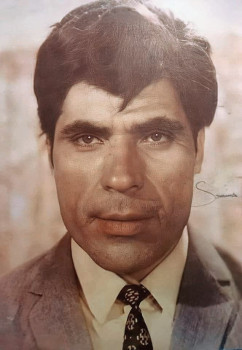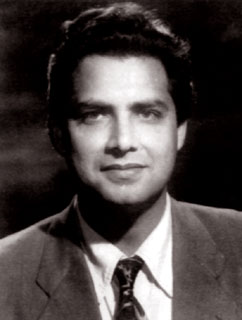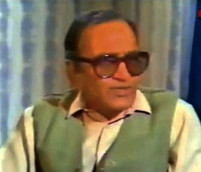Related Research Articles

Mehdi Hassan Khan 18 July 1927 – 13 June 2012) was a Pakistani ghazal singer and playback singer for Lollywood. Widely considered one of the greatest and most influential figures in the history of ghazal singing, Hassan is referred to as the "Shahenshah-e-Ghazal". Known for his "haunting" baritone voice, Hassan is credited with bringing ghazal singing to a worldwide audience. He is unique for his melodic patterns and maintaining integrity of the ragas in an innovative way.

Mohammad Saeed Khan, better known as Rangeela, was a Pakistani Lollywood actor, singer and director. He is regarded as one of the finest comedians of the Pakistani film industry. He performed in over 300 films in his career spanning over 4 decades.

Ahmed Rushdi, SI, PP was a versatile Pakistani playback singer and was "an important contributor to the golden age of Pakistani film music." Regarded as one of the greatest singers in South Asia who could sing high tenor notes with ease, he is best known for his versatility and distinctive voice, with complex and dark emotional expressions. Considered as the first pop singer of South Asia, he sang South Asia's first pop song, "Ko Ko Korina", in the 1966 film Armaan.

Syed Musa Abbas Raza, better known as Santosh Kumar, was a Pakistani film actor who was popular in the 1950s and 1960s. He was from an Urdu-speaking family from Lahore, Pakistan. His brother Darpan was also a film actor during the same period, while his other brother S. Suleman was a film director.
Waqar Ali is a Pakistani musician and singer working mostly in Pakistan.

Masood Rana (Urdu: مسعُود رانا, 6 August 1941 – 4 October 1995) was a Pakistani film playback singer. He began his singing career in 1962 with the film Inqalab, became one of the top male singers in both Urdu and Punjabi films for more than three decades and remained a busy singer until his death in 1995.
Tehzeeb (transl. Culture) is a 1971 Pakistani film. It stars Rani, Shahid, Saeed Khan Rangeela, Aslam Pervaiz and Lehri.

Baharo Phool Barsao, is a 1972 Pakistani Urdu-language romance film produced and directed by Indian director Mehmood Sadiq. He had come from India to produce and direct this film, but died halfway through its production. It was completed by the Pakistani film director Hassan Tariq.
Shaukat Ali, also known as Shaukat Ali Khan, was a Pakistani folk singer.

Raja Mehdi Ali Khan was an Indian poet, writer and a lyricist.

Naheed Akhtar is a Pakistani playback singer. She is tagged as the "Nightingale of Pakistan". She was the top Lollywood playback singer during the second half of 70s and 80s. She won 3 Nigar Awards and a Pride of Performance in 2007.
Khawaja Pervez, (28 December 1930 – 20 June 2011) was a prominent Pakistani film composer- lyricist and film songwriter for both Urdu and Punjabi language films. His real name was Khawaja Ghulam Mohiuddin. His professional career span was over 40 years.

Master Abdullah, was a Pakistani film music composer. He is known for his music in movies like, "Badla" (1968), "Commander" (1968), "Ziddi" (1973), and "Sheeshay Ka Ghar" (1978).
M. Ashraf or Muhammad Ashraf was a Pakistani film composer. In the early 1960s, he first started as one member of the music directors duo of Manzoor - Ashraf in the Pakistan film industry.

Maryam Tanveer, known by her stage name Maya Ali, is a Pakistani actress. She made her debut with a brief role in telenovela Durr-e-Shehwar and later received praise for portraying the titular characters in Aik Nayee Cinderella and Aun Zara both (2012). Ali got breakthrough for her performance as Manahil Javed in Hum TV's romance Mann Mayal. In 2018 she made her film debut with Teefa In Trouble.

Shamim Nazli, was a Pakistani music director. She composed playback music for movies like Baharein Phir Bhi Ayein Gi (1969) and Bin Badal Barsaat (1975). She was the elder sister of playback singer Mala. She is known to be the only female musician in the history of Lollywood.

Kamal Ahmed, was a Pakistani film music director. He has the second-highest number of film scores of more than 100 Urdu movies, after M. Ashraf who did more than 250 Urdu movies as a music director. Kamal won 6 Best Musician Nigar Awards during his long film career.

Nazir Ali was a Pakistani film music director. He is tagged as the "king of dhamaal". He composed 123 songs in 39 Urdu films and 435 songs in 115 Punjabi films. He won 2 Nigar Awards during his music career prolonged over three decades.

Niaz Ahmed was a Pakistani television, radio, and film musician. He is known for composing classical, semi-classical, and patriotic songs for Radio Pakistan and Pakistan Television. His popular melodies include "Itne Baray Jeevan Saagar Mein Tu Ne Pakistan Dia", "Dekh Tera Kiya Rang Kar dia Hai", "Mera Inaam Pakistan", and many others. He was honored with the Pride of Performance Award in 2004.
References
- ↑ Music composer Sheheryar laid to rest Dawn (newspaper), 10 January 2011. Retrieved 7 January 2021
- 1 2 3 4 5 6 "Tassawar Khanum film songs". Pakistan Film Magazine website. Archived from the original on 28 April 2017. Retrieved 23 November 2022.
- 1 2 Profile of Tassawar Khanum on tareekhepakistan.com website Retrieved 7 January 2021
- ↑ 127 awards conferred on Pakistan Day Tassawar Khanum's award info on Dawn (newspaper), Published 26 March 2006. Retrieved 7 January 2021